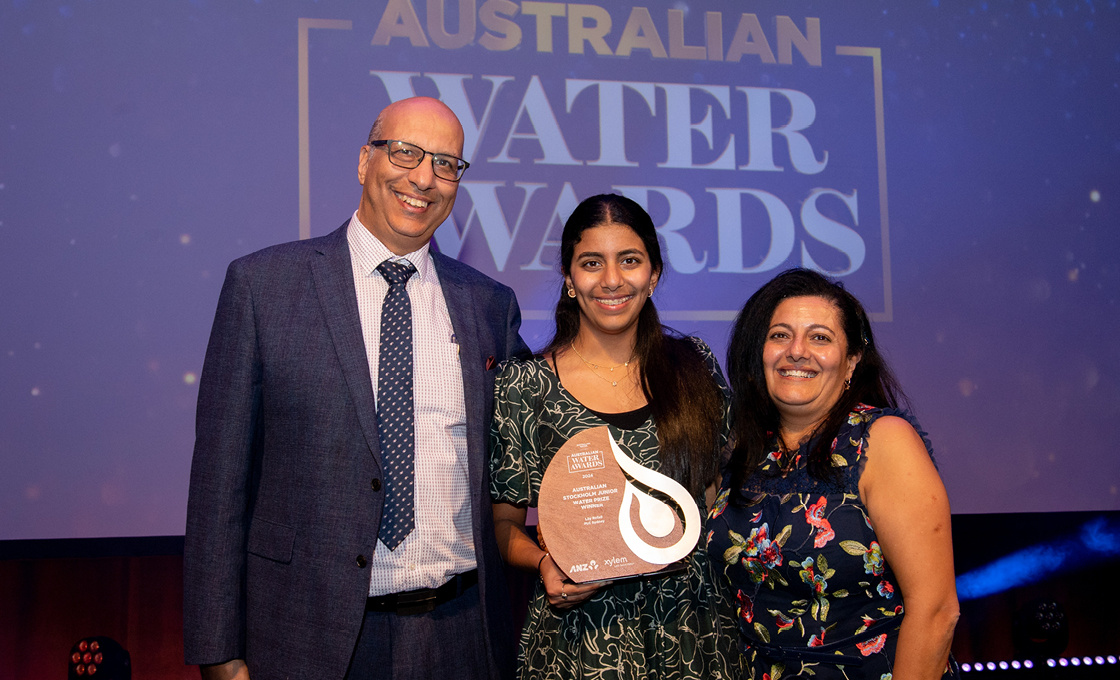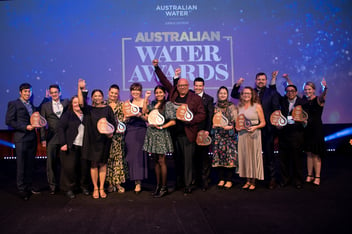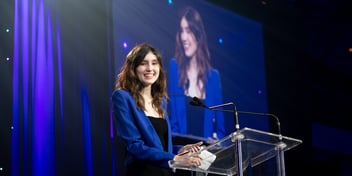2024 Australian Stockholm Junior Water Prize winner set to take the world stage

Young scientists are set to play a crucial role in creating a sustainable water future and, if the 2024 Australian Stockholm Junior Water Prize winner is an indication of young peoples’ dedication to change and innovation, the future is looking very bright.
Presented as part of the Australian Water Awards and sponsored by Xylem, the 2024 Australian Stockholm Junior Water Prize was awarded to Lily Rofail from PLC Sydney at Ozwater’24 earlier this year. State and territory individual and project awards are now open for nominations.
Receiving the prestigious accolade for her impressive project investigating the removal of heavy metals from aquatic environments utilising avocado skin power and hyssop, Lily said her research was inspired by her deep interest in water challenges.
“I've always enjoyed being surrounded by water. I was part of my school's rowing team for a number of years. During training on the water, I was well positioned to see water quality issues firsthand,” she said.
“I noticed that after rain, the water would become heavily contaminated due to run off. This inspired me to find a way to prevent water quality issues in Australia, and potentially worldwide, as well.
“All in all, I find water challenges very interesting and want to help make a change.”
Lily said it was exhilarating to receive the Stockholm Junior Water Prize at Ozwater’24.
“I was probably the youngest person in the room, and it was amazing being surrounded by such open-minded and dedicated people. It was such an enlightening and welcoming experience,” she said.
“I learned a lot about other water issues at Ozwater’24, too. I am really grateful for the experience.
“In August, I will be heading off to Stockholm, Sweden, to present my project internationally. I can't thank AWA and Xylem enough for providing me with such an amazing opportunity. I am very excited about this next step onto the international stage.
“I am looking forward to meeting other likeminded young people and to learn all about their projects. It's encouraging to see so much action and involvement occurring among young people around the world. It’s amazing to see the global reach of this youth movement towards sustainability.”
Award winning work
When it comes to Lily’s award-winning project, the primary goal was to find a new way of reducing heavy metal contamination in water environments, involving lots of research and thinking around sustainable and nature-based solutions.
“I came across avocado skin powder and water hyssop. I chose avocados skin powder because my grandpa grows avocados, which means I could ensure how the avocados were grown,” she said.
“Also, over 1.3 billion avocados are thrown into landfill each year. So I wanted to utilise avocados to reduce waste in landfill, as well. Water hyssop is a native aquatic plant. I selected this plant because it wouldn't disturb the natural ecosystem of Australian waters.
“When devising nature-based solutions, it’s important to utilise native species that don’t invade or disturb native plants and ecosystems. That’s why it is important that water hyssop is a native aquatic plant. And I found that both avocado skin powder and water hyssop significantly reduced copper concentrations.”
To measure this, Lily chose two methods: “I use duckweed as a measure, which is a floating plant commonly used globally to observe heavy metal concentrations. I also used a calorimeter, which is a basic way of measuring exact changes”.
“Duckweed provides a natural way to demonstrate what the true ecosystem would look like. It’s a free-floating plant that is commonly found in aquatic ecosystems. If there is less duckweed, this indicates a higher concentration of heavy metal contamination,” she said.
“The calorimeter was used to ensure that the measurements taken in relation to the duckweed were accurate.
“I found that the application of avocado skin powder was most suitable for aquatic environments with poor nutrient quality, but high heavy metal contamination. Whereas hyssop is good for aquatic environments with high nutrient quality and high contamination levels.”
Studying STEM
When it comes to studying and researching within STEM, Lily said she enjoys the work because of the opportunity to develop real-world solutions to some of the world’s biggest challenges.
“STEM is a field where you can really make anything happen. It’s an area of research that welcomes inquiry, innovation and action, things I believe to be very significant and important,” she said.
“Environmental action is becoming more and more crucial due to the potentially irreversible effects of global warming and climate change. And I see that, through STEM, this is where I can really make a change.”
At school, Lily is a member of the Science Festival Committee, which organises and plans a science conference held at her school, aiming to celebrate science and inspire young science minds.
“I'm also part of my school’s Sustainable Education Environment Development group. We celebrate students’ science research, student projects both inside and outside of school,” she said.
“We facilitate activities in our school to ensure our school is as environmentally friendly as possible. We've engaged in a new bin system, we got rid of all the landfill bins around our school.
“We now have more options for waste disposal, to help with recycling different materials. While this change isn’t huge, it's something that can still make a difference and hopefully inspire other schools to do the same thing.”
Bright future
Lily said that, in the short term, she plans to continue to do more research and spread awareness about water issues, but she thinks water could also be part of her future.
“I do a lot of public speaking and debating at school, so I really enjoy communicating issues and raising awareness,” she said.
“In the long term, I would definitely like to do further study within STEM subjects. It really is my passion. I'm not quite sure what area of STEM I will end up in, but I feel it’s an area of work where I can make a real difference.”
Lily said her experience receiving the 2024 Australian Stockholm Junior Water Prize at Ozwater’24 was an incredible experience, one that showcased the dedication of the sector in supporting young people to engage and participate.
“It’s important for the sector to be supportive and engaged with young scientists in order to broaden the scientific community. As the saying goes, the more the merrier. The more perspectives included in problem solving, the more robust the ideas will be,” she said.
“My teachers have been really supportive and encouraging of young scientists at my school. It really makes a difference when students are supported to think and create to make change.
“Many young people want to engage in making a difference. We have a lot to contribute. And with the threats facing our environment and water, it’s never been more important for the next generation to be included in solutions.”
Do you know a budding young scientist with a mind for making a difference? Take a look at the Stockholm Junior Water Prize registration information here. Applications open in October 2025.


